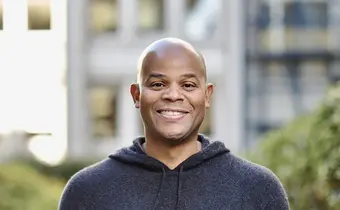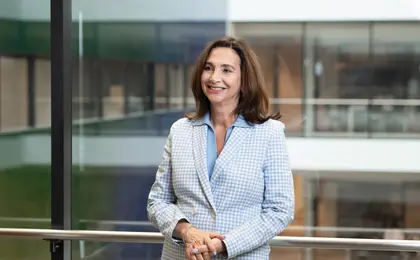
Corey Harrison ’11
MBA
Co-founder and CEO, Flip AI
When Corey Harrison was selected for the prestigious White House Fellows program in 2015, he found himself invited to interview with more government agencies than any of his peers. The demand for his services, he says, was an indication of the federal government’s dire need for tech-savvy civil servants. Harrison’s fellow fellows were highly respected doctors, teachers, nonprofit leaders, and service members, but they did not, as a general matter, know technology.
“There’s a lot of room for technological improvement in the government,” Harrison laughs.
Harrison ultimately accepted a fellowship with the U.S. Department of Defense, where he worked closely with the late Secretary of Defense Ashton B. Carter and developed the Defense Digital Service, a team of tech experts that works to improve government services (the initiative was modeled on the digital service President Barack Obama created after the troubled launch of Healthcare.gov in 2013). Harrison’s work earned him the Secretary of Defense Medal for Outstanding Public Service and helped propel him into jobs at investment firm KKR and the National Football League.
Today Harrison is co-founder and chief executive officer of the startup Flip AI, an artificial intelligence-powered platform that can troubleshoot the software systems undergirding large companies and organizations. He left what he describes as a “once-in-a-lifetime” job as senior vice president of operations and chief of staff to NFL Commissioner Roger Goodell to launch Flip AI.
“Running a company has been a dream of mine for a long time,” he says of the decision. “At the end of my career, I want to look myself in the mirror and know that I tried my best to honor that dream.”
Early results are promising: Flip AI had paying customers before it had a real website; it now counts a global media company, multiple leading banks, and a leading technology company among its clients. In November, Flip AI announced that it had received $6.5 million in seed funding from backers including Factory, Morgan Stanley Next Level Fund, and GTM Capital.
Harrison’s entrepreneurial inclinations came early.
“When I was a kid, I studied Black Enterprise,” a magazine and multimedia platform that covers Black businesses, says Harrison, whose grandfather and great grandfather were entrepreneurs. “I wanted to build something of my own.”
Growing up in New Orleans and New Jersey, he was raised by a single mom in a supportive community of neighbors and friends. Harrison attended Lehigh University after a friend’s mom insisted he come visit the school with her son. He filled out his application on a borrowed computer and went on to major in business information systems, which he felt combined his passion for technology with his interest in helping companies transform their enterprise-level processes. While earning his master’s degree, he worked at Johnson & Johnson and later the Tata Group.
“I was on the fast track to becoming a CIO [chief information officer],” he says. “Basically, I was going to be a tech and operations leader.”
But Harrison wanted more. He applied to Yale SOM, where he was drawn to the mission of educating people for business and society and was part of the school’s first class of fellows admitted as part of the Consortium for Graduate Study in Management, a nonprofit that seeks to increase the number of underrepresented U.S. minorities in business programs.
After graduating in 2011, he worked for two years at UBS, but then was laid off. Next, he returned to his first love—technology—in a strategy and development role with iCIMS, a cloud-based HR software company. While there, he applied for the White House Fellows program, telling his boss not to worry—that the application was a “lottery ticket” with a small chance of success. Then he was accepted.
“As they say, ‘When the president calls, you go,’” he laughs.
After his accomplishments at the Department of Defense, Harrison’s skills were in high demand. He was first recruited to lead innovation at KKR and then to the NFL, where he helped Goodell lead the league through its 100th season, a collective bargaining agreement with the NFL Players Association, negotiations for a new media deal, the protests surrounding the murder of George Floyd, and the global pandemic, which necessitated the league’s first-ever virtual draft.
Harrison says he would still be at the NFL were it not for his drive to run his own company. He felt the time was right to make the move.
“I had spent about a decade trying to get the right experience,” he says. “On one side of that decade was SOM and on the other was the NFL. With those two bookend experiences, along with a truly unique set of other roles, I basically had a PhD in building and running large enterprises.”
In 2021, Harrison quit his job to create Flip AI, which started as an idea to create intelligent workspaces that would help people manage all the “pings and tings” they receive from various technology platforms. But he and his co-founders quickly realized the artificial intelligence they were creating was the real “discovery.” They trained their own large language model on so-called DevOps data that helps businesses resolve system-based disruptions.
In his work, Harrison says he regularly draws on the lessons he learned from SOM, including those from the integrated curriculum.
“The traditional siloes of business don’t work,” he says. “Having that perspective—being mentally agile—has been very helpful.”
Most importantly, Harrison says he appreciates SOM’s dual focus on business and society.
“You can’t be at a private company and ignore the public implications, and you can’t be in the public sector and ignore the private sector,” he says. “SOM helped me integrate my thinking around those pieces.”





